Alfuzosin is a medication used to treat symptoms of an enlarged prostate, also called benign prostatic hyperplasia (BPH). It works by relaxing muscles in the prostate and bladder neck, making it easier to urinate. But like all medicines, it comes with side effects - some mild, some more serious. The good news? Most side effects can be reduced or avoided with simple, practical steps. If you're taking alfuzosin and feeling dizzy, lightheaded, or just off-balance, you're not alone. And you don’t have to just live with it.
Start with the Right Dose
Alfuzosin 10 mg once daily is the standard dose for adults. But taking it at the wrong time or in the wrong way can make side effects worse. The extended-release tablet must be taken after the same meal every day. Skipping meals or taking it on an empty stomach can cause a sudden drop in blood pressure, leading to dizziness or fainting. This isn’t just a warning - it’s a rule backed by clinical trials. A 2023 study in the Journal of Urology found that patients who took alfuzosin without food had 3 times the rate of orthostatic hypotension compared to those who took it with food.Don’t crush, chew, or split the tablet. It’s designed to release slowly. Breaking it changes how your body absorbs the drug. Stick to swallowing it whole, right after eating.
Take It at the Right Time
Timing matters more than you think. Alfuzosin can make you feel dizzy, especially in the first few days. That’s because it lowers blood pressure. The biggest risk? Standing up too fast after sitting or lying down. That’s when you’re most likely to feel faint or even fall.Take your dose after dinner, not breakfast. Why? Because you’ll be sitting or lying down for the next several hours - mostly while sleeping. That reduces your chance of standing up suddenly when the drug hits its peak. Most people feel the strongest effects 2 to 4 hours after taking it. Taking it at night means you’re less likely to be moving around during that window.
If you’ve been taking it in the morning and getting dizzy in the afternoon, switch to evening. Give it a week. Many patients report a big drop in dizziness after this simple change.
Move Slowly - Especially When Standing
This sounds obvious, but people forget. Alfuzosin affects blood pressure regulation. When you stand up quickly, your body doesn’t adjust fast enough. Blood pools in your legs. Your brain gets less oxygen. Result? Lightheadedness, blurred vision, or worse - a fall.Here’s what to do:
- When sitting, pause for 10 seconds before standing.
- Stand up slowly - don’t jump out of bed or from the couch.
- Hold onto something stable, like a table or wall, as you rise.
- If you feel dizzy, sit or lie down right away.
These aren’t just tips - they’re safety habits. A 2024 Australian study of men over 65 on alpha-blockers found that those who followed this routine cut their risk of falls by 62%. That’s not small. It’s life-changing.
Avoid Alcohol and Other Blood Pressure Drugs
Alcohol makes alfuzosin’s side effects worse. Even one drink can cause your blood pressure to drop too low. You might not feel drunk - just unusually tired, dizzy, or confused. That’s not normal. That’s a warning sign.Also, be careful with other medications that lower blood pressure. This includes:
- Diuretics (water pills like hydrochlorothiazide)
- Other alpha-blockers (like tamsulosin or doxazosin)
- Some antidepressants (like trazodone or mirtazapine)
- ED drugs (sildenafil, tadalafil)
Combining alfuzosin with sildenafil (Viagra) or tadalafil (Cialis) can cause a dangerous drop in blood pressure. If you’re using one of these, talk to your doctor. You might need to space them out or switch to a different treatment.
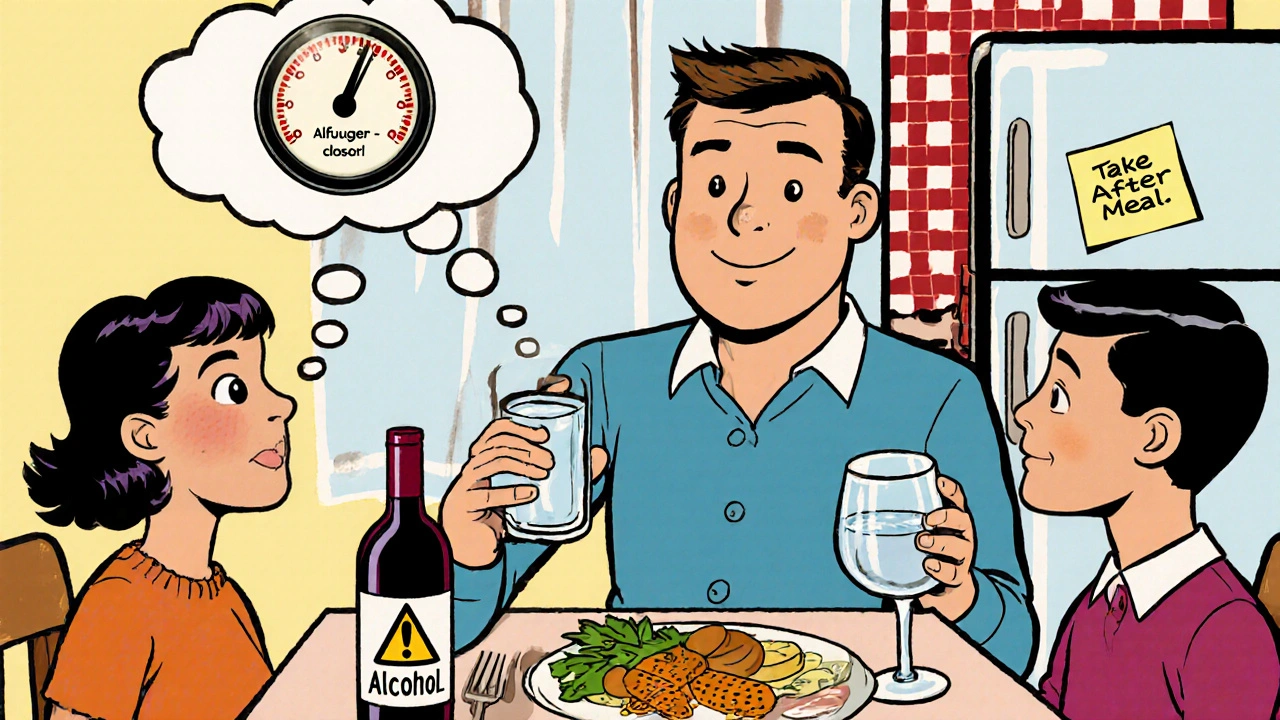
Watch for Warning Signs - Don’t Ignore Them
Most side effects of alfuzosin are mild: dizziness, headache, tiredness, or stuffy nose. These usually fade after a week or two as your body adjusts.But some signs need immediate attention:
- Sudden, severe dizziness or fainting
- Fast or irregular heartbeat
- Swelling in your hands, feet, or face
- Painful or prolonged erection (lasting more than 4 hours)
Prolonged erection - called priapism - is rare but serious. If it happens, go to the ER. Left untreated, it can cause permanent damage. Don’t wait. Don’t hope it goes away.
If you feel like you’re going to pass out, lie down and elevate your legs. This helps blood flow back to your brain. If it keeps happening, your doctor might lower your dose or switch you to another medication.
Stay Hydrated - But Not Too Much
Dehydration makes dizziness worse. If you’re sweating a lot, exercising, or in hot weather, drink water. But don’t overdo it. Drinking too much water can dilute your electrolytes and make low blood pressure worse.Drink enough so your urine is light yellow - not clear, not dark. That’s the sweet spot. Avoid large amounts of caffeine or sugary drinks. They can dehydrate you and spike your blood pressure, which creates a rollercoaster effect when alfuzosin kicks in.
Don’t Stop Suddenly
You might feel better after a few weeks and think you don’t need it anymore. Don’t quit without talking to your doctor. Stopping alfuzosin suddenly can cause your symptoms to come back fast - and sometimes worse than before. Your prostate muscles will tighten again. Urination becomes difficult again.Always taper off under medical supervision. Your doctor might switch you to another drug or adjust your dose gradually. Never self-discontinue.
Track Your Symptoms
Keep a simple log for the first month:- When you took your dose
- What you ate
- Any dizziness, fainting, or palpitations
- How well you urinated
This helps you and your doctor spot patterns. Maybe you’re fine after dinner but dizzy after lunch. Maybe you feel better after walking for 10 minutes. These details matter. Bring this log to your next appointment.
When to Talk to Your Doctor
You don’t have to suffer in silence. If side effects are affecting your daily life, speak up. Your doctor can:- Adjust your dose
- Switch you to a different alpha-blocker (like tamsulosin, which has fewer blood pressure effects)
- Check for other causes (like low iron or thyroid issues)
- Rule out heart problems
Some men do better on tamsulosin because it’s more targeted to the prostate and less likely to affect blood pressure. But it’s not for everyone. Your doctor will decide based on your health history, age, and other meds.
Real-Life Example: John’s Story
John, 71, from Melbourne, started alfuzosin for trouble urinating. He got dizzy every morning. He almost fell once getting out of bed. He thought it was just aging. Then he switched to taking it after dinner. He started standing up slowly. He stopped drinking wine at night. Within 10 days, his dizziness dropped by 80%. He didn’t need to change meds. He just changed how he took it.He’s still on alfuzosin. And he’s back to gardening on weekends.
Can alfuzosin cause low blood pressure?
Yes, alfuzosin can lower blood pressure, especially when taken on an empty stomach or combined with other blood pressure medications. This is why it’s critical to take it after the same meal every day. Low blood pressure from alfuzosin usually causes dizziness, lightheadedness, or fainting when standing up quickly. These effects are most common in the first few weeks of treatment.
Is it safe to take alfuzosin with alcohol?
No, it’s not safe. Alcohol can intensify alfuzosin’s effect on blood pressure, increasing the risk of dizziness, fainting, or falls. Even one drink can trigger these symptoms. If you drink regularly, talk to your doctor about cutting back or avoiding alcohol while on this medication.
How long do alfuzosin side effects last?
Most mild side effects - like dizziness, headache, or tiredness - improve within 1 to 2 weeks as your body adjusts. If side effects persist beyond 3 weeks or get worse, contact your doctor. You may need a dose adjustment or a different medication.
Can I take alfuzosin if I have heart problems?
Alfuzosin is generally safe for people with heart conditions, but it requires careful monitoring. If you have low blood pressure, heart failure, or a history of fainting, your doctor may start you on a lower dose or choose a different treatment. Always tell your doctor about your heart history before starting alfuzosin.
What should I do if I miss a dose?
If you miss a dose, skip it and take your next dose at the regular time. Don’t double up to make up for a missed dose. Taking two doses close together can cause a dangerous drop in blood pressure. Always take alfuzosin after a meal, even if it’s a light snack.
Are there better alternatives to alfuzosin?
Yes. Tamsulosin is often preferred because it’s more selective for the prostate and less likely to affect blood pressure. Other options include silodosin or non-medication treatments like prostate artery embolization or minimally invasive surgery. Your doctor will choose based on your symptoms, age, other health conditions, and medication history.

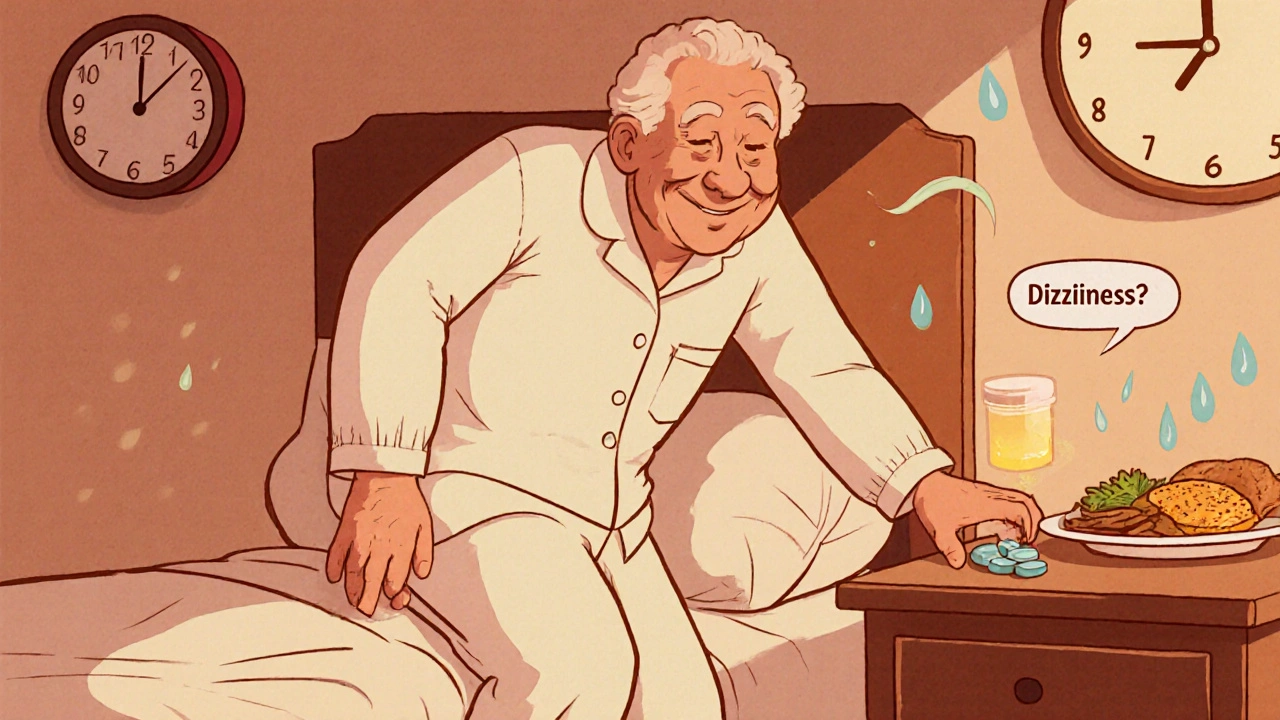
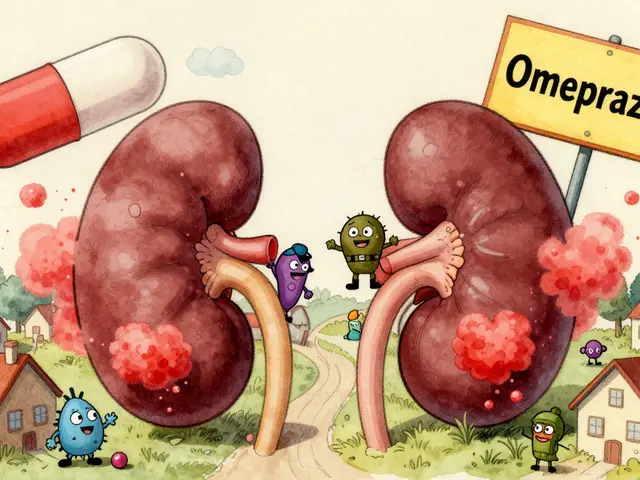
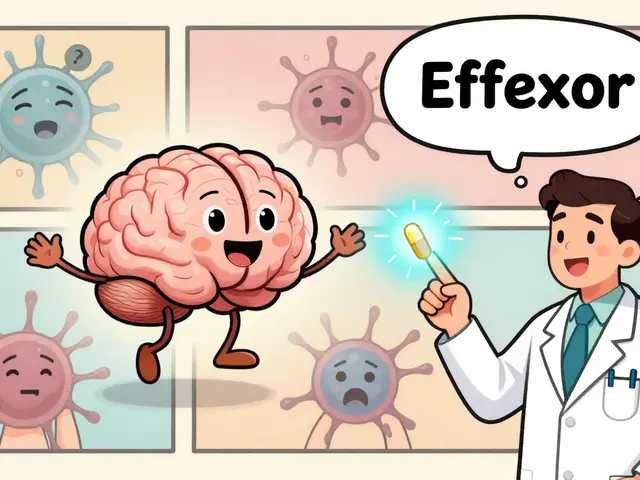

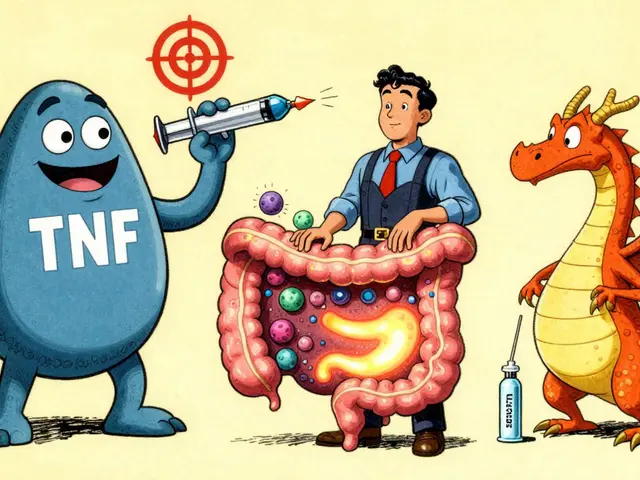
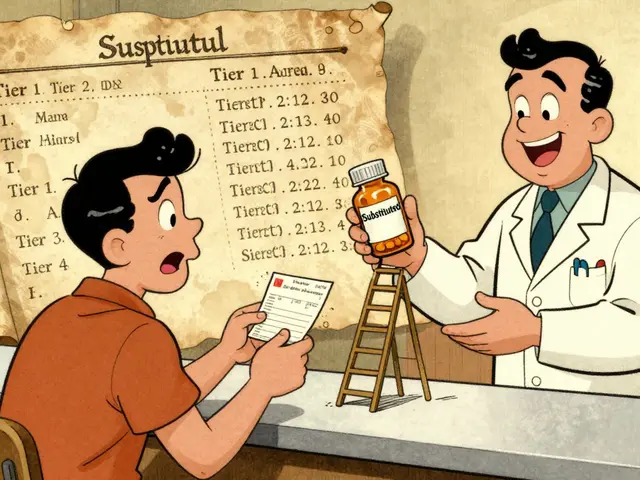


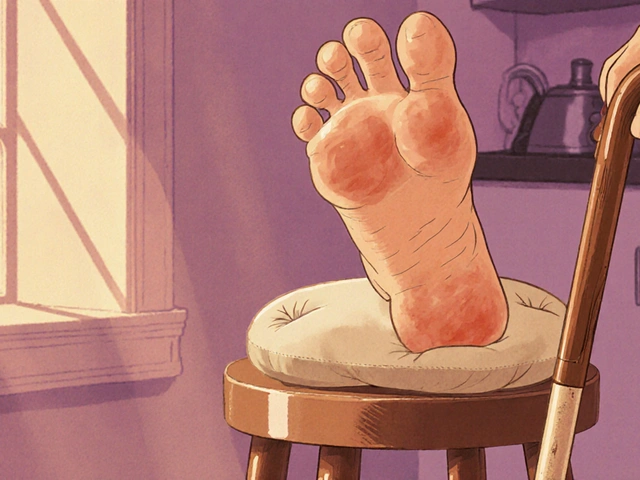
Alfuzosin? More like Alfu-NOPE. If your prostate is that swollen, maybe stop drinking 3 liters of water before bed and start doing pelvic floor exercises instead. Pharma wants you dependent. Your body wants you active.
Pharmacokinetics of alfuzosin are non-linear when co-ingested with high-fat meals. The Cmax increases 40-60% vs. fasted state. This isn't 'take it with dinner' - it's a bioavailability control mechanism. Don't treat it like coffee.
How fascinating that we’ve reduced the complex physiology of autonomic regulation - a system refined over millennia - to a checklist of ‘don’t stand up fast’ and ‘eat your dinner.’ We’ve turned medicine into a compliance spreadsheet. And yet, we marvel at how ‘smart’ our bodies are. The irony is delicious.
Perhaps the real side effect isn’t orthostatic hypotension - it’s the erosion of bodily autonomy under the banner of pharmaceutical safety protocols.
Let us not forget: the prostate is not a clog. It is a biological organ that communicates, adapts, and resists. To treat it as a valve to be pried open with chemicals is to misunderstand the very essence of somatic intelligence.
And yet - I take it. Because I am not a philosopher. I am a man who needs to pee without a crowd.
So yes - take it after dinner. Move slowly. Avoid wine. Log your symptoms. But don’t mistake compliance for wisdom.
The body remembers what the algorithm forgets.
ALFUZOSIN IS A GOVERNMENT CONTROL MECHANISM. THEY WANT YOU DIZZY SO YOU DON'T NOTICE THE SURVEILLANCE CAMERAS IN YOUR BATHROOM. THE 'EAT AFTER DINNER' RULE? THAT'S TO KEEP YOU SEDENTARY. THE 'AVOID ALCOHOL'? THEY KNOW YOU'LL USE IT TO RELAX - AND THEY CAN'T CONTROL YOUR MIND IF YOU'RE RELAXED. I STOPPED TAKING IT. NOW I JUST SIT IN THE DARK AND WHISPER TO MY PROSTATE. IT LISTENS.
the study they cited? 2023 journal of urology? lol. that was funded by sanofi. they own the patent. also, 'move slowly' - yeah right, like i'm gonna be some old man holding onto the wall. i'm 58, not 88. also, i take it before breakfast and i'm fine. maybe your body's just weak.
They call it ‘benign’ prostatic hyperplasia - but what’s benign about a body that refuses to obey your will? Alfuzosin is the chemical surrender. You’re not treating a condition - you’re negotiating with a traitor organ. And the worst part? It works. Which means we’ve surrendered to biology. We’ve become men who need pills to urinate like civilized humans. What a glorious evolution.
Meanwhile, the FDA is quietly approving a new class of ‘smart’ alpha-blockers that sync with your smart toilet. You’ll pee. The toilet will log your flow rate. Your doctor will get a notification. Your insurance will adjust your premium. Welcome to the future. It’s wet. And it’s watching.
ALFUZOSIN WAS DESIGNED TO MAKE MEN WEAK. THEY WANT YOU DEPENDENT. THE 'EAT AFTER DINNER' THING? THAT'S TO MAKE YOU SLEEP EARLY SO YOU DON'T WATCH THE NEWS. THE 'AVOID ALCOHOL'? THEY KNOW YOU'LL USE IT TO STAND UP TO THE SYSTEM. I TOOK IT ON AN EMPTY STOMACH FOR 3 WEEKS. I DIDN'T FAINT. I JUST GOT MORE ANGRY. AND NOW I RUN 10 MILES EVERY MORNING. THEY CAN'T CONTROL ME.
I’ve been on this for 6 months. Took it at breakfast, got dizzy every afternoon. Switched to after dinner, started standing up like a turtle - one inch at a time. No more near-falls. I track everything in a notebook. My urologist was shocked at how much detail I had. We lowered my dose by 25%. I feel better than I have in years. You don’t have to suffer. You just have to be patient and precise. This isn’t magic. It’s management. And you’re capable of it.
OMG I JUST REALIZED I’VE BEEN TAKING THIS WITH BREAKFAST 😭 I’M SO STUPID. I ALMOST DIED ON THE TOILET LAST WEEK AND THOUGHT IT WAS JUST ‘AGING’ 😭😭😭 I’M SWITCHING TO DINNER RIGHT NOW. THANK YOU FOR THIS POST. I’M CRYING AND HUGGING MY TOILET NOW 💕🫂
It is worth noting that the physiological response to alfuzosin is mediated primarily through alpha-1A adrenergic receptor antagonism, which exhibits tissue selectivity. The clinical observation that timing with meals reduces orthostatic hypotension is not merely behavioral - it is pharmacodynamic. Food delays gastric emptying, modulates hepatic first-pass metabolism, and alters plasma protein binding. To reduce this to ‘take it after dinner’ is to mistake mechanism for mnemonic. The true insight lies in understanding that the body is not a machine to be commanded, but a dynamic system to be harmonized. One does not ‘manage’ side effects - one aligns with physiology.